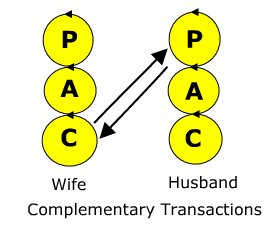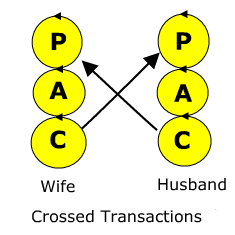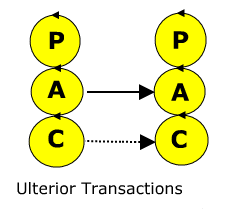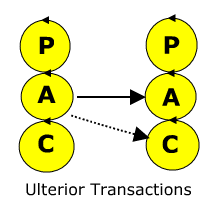|
Analyzing Transactions
Any time one person recognizes another with a smile, a nod, a frown, a verbal greeting, etc.,
this recognition, in TA language, is called a stroke.
Two or more strokes make a transaction.
All transactions can be classified as complementary, crossed, or ulterior.
Complimentary Transactions
A complimentary transaction occurs when a message, sent from a specific ego state,
gets the predicted response from a specific ego state in the other person.
Berne describes a complimentary transaction as one which is "appropriate and expected
and follows the natural order of healthy human relationships."
For example, if a wife who is grieving for her lost friend is comforted by a synthetic husband,
her momentary dependency need is answered appropriately as in this diagram.

A complimentary transaction can occur between any two ego states.
For example, two people may transact Parent-Parent when lamenting their children's leaving home;
Adult-Adult when solving a problem; Child-Child or Parent-Child when having fun together.
A person can transact from his or her Parent with any of the ego states of another person
and can also do this with the Adult and Child ego states.
If the response is the expected one, the transaction is complementary.
The lines of communication are open, and the people can continue to transacting with one another.
Gestures, facial expressions, body posture, tone of voice, and so forth, all contribute
to the meaning in every transaction.
If a verbal message is to be completely understood, the receiver must take into consideration
the nonverbal aspects as well as the spoken words.
When the transactions are complimentary, communication is open because the response is given
where expected and were appropriate to the stimulus.
This does not always happen.
Sometimes a stimulus receives an unexpected or inappropriate response, and the lines of communication become crossed.
Crossed Transactions
When two people stand glaring at each other, turn their backs on each other, are unwilling
to continue transacting, or are puzzled by what has just occurred between them,
it is likely that they have just experienced a crossed transaction.
A crossed transaction occurs when an unexpected response is made to the stimulus.
An inappropriate ego state is activated, and the lines of transacting between the people are crossed.
At this point, people tend to withdrawal, turn away from each other, or switch the conversation
in another direction.
If a husband responds unsympathetically to his grieving wife, "Well, how do you think I feel!"
He is likely to cause her to turn away from him.

Crossed transactions are a frequent source of pain between people -- parents and children,
husband and wife, boss and employee, teacher and student, and so forth.
The person who initiates a transaction, expecting a certain response, does not get it.
The individual is crossed up, and often feels discounted and misunderstood.
Transactions may be direct or indirect, straightforward, or deluded, intense or weak.
Indirect transactions are three-handed.
One person speaks to a another while hoping to influence the third who can overhear it.
For example, a man may be too afraid to speak directly to his boss, so he says something
to a coworker, hoping the boss will "get the message."
Diluted transactions are often half hostile, half affectionate.
The message is buried in some form of kidding.
For example, one student may say to another, "Hey genius, when are you going to finish that book?
I want to read it."
The other may toss the book, saying, "Here you are, butterfingers. Catch it if you can."
Weak transactions are those that are superficial, perfunctory, and lack feelings of intensity.
Such is the case if a wife says to her husband, "I wonder if we should go out for dinner tonight,"
and he responds, " I don't care, dear. Whatever you say, dear."
In healthy relationships people transact directly, straightforward and, on occasion, intensely.
These transactions are complimentary and are free of ulterior motives.
Ulterior Transactions
Ulterior transactions are the most complex.
They differ from complimentary and crossed transactions in that they always involve
more than two ego states.
When an ulterior message is sent, it is disguised under a socially acceptable transaction.
Such is the purpose of the old cliché: "Wouldn't you like to come up to see my etchings."
In this instance the Adult is verbalizing one thing while the Child, with the use of innuendo,
is sending a different message.

If a car salesman says with a leer to his customer, "This is our finest sports car, but it may be
too racy for you," he is sending a message that can be heard by either the customers Adult
or Child ego state.
If the customers Adult hears, the response may be, "Yes, you're right, considering the
requirements of my job."
If the customer’s Child hears, the response may be, "I’ll take it. It's just what I want."

An ulterior message is also given when a secretary submits a letter with several typewriting errors
to the boss.
This invites the boss to give the secretary and a Parental put-down.
The same thing happens when a student is continually late with assignments, absent from class,
writes illegibly, or in some way, it provokes the equivalent of parental criticism.
The same kind of ulterior transactions occurs if a man who has been a "reformed" alcoholic
comes to work with a hangover, but a glimmer in his eye, and brags to his coworker,
" Boy, I really blew it last night and drank myself under the table. What a head I've got today!"
On the surface, he is giving factual information.
However, at the ulterior level, the alcoholic’s Child ego state is looking for the Parent in the other
to smile indulgently and to condone his drinking.
Instead of a Parent response, he may activate his coworker's Child ego state,
and he may respond by laughing at the tragedy.
If the coworker laughs, from either his Parent or his Child ego state, he reinforces
the (parental) injunction, usually given not verbally to the alcoholic (as a child), "Get lost, you bum."
This inappropriate laugh or smile is described by Claude Steiner as the gallows transaction.
This serves to tighten the noose, and the destructive behavior is reinforced.
Any smiling response to a person's misfortunes may serve as a gallows transaction.
Such is the case when a teacher acts amused at a pupil's "stupid behavior."
Such is the case when a mother laughs at her accident-prone three-year-old.
Such is the case also when a father beams over the risks that his son takes.
These gallows transactions, like other transactions with ulterior motives, are common among losers.
Losers use them to promote their psychological games.
See more under Games People Play.
|